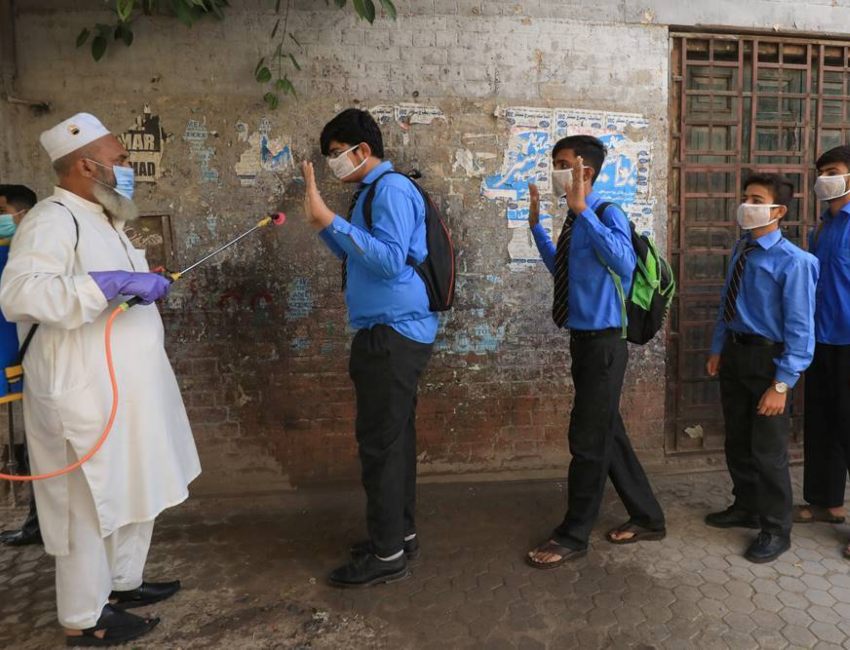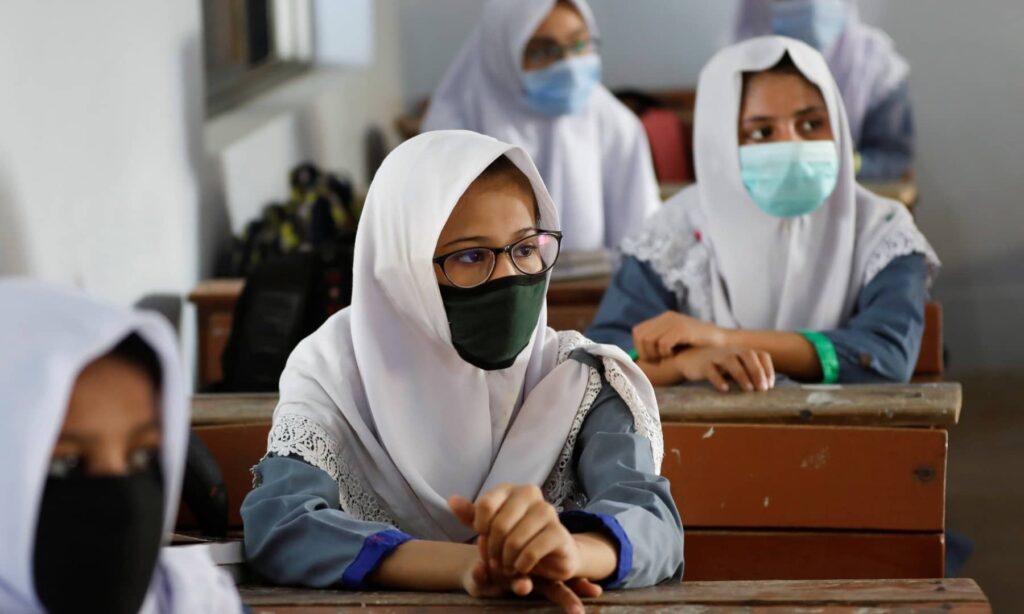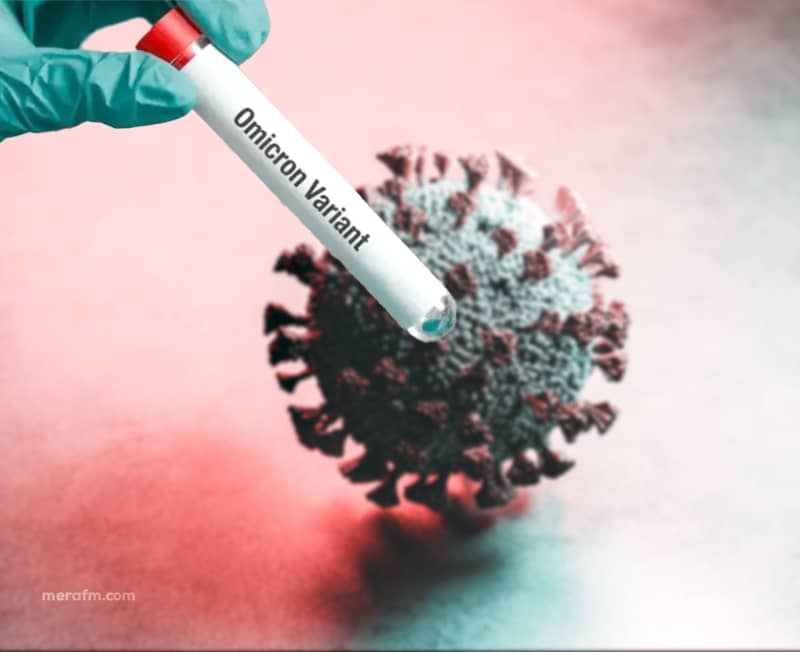
Govt to start covid-19 vaccination of children over 5
Covid-19 vaccination to start for aged 5 and above
Islamabad: Qadir Patel, the federal minister of health, announced in a press conference in Islamabad, that the government will shortly begin immunising children older than five years old against COVID-19.
In September of last year, Pakistan launched a statewide campaign to immunise children over 12 in educational institutions.
Also Read: The Omicron sub-variant: What we know so far about BA.2.12.1
According to the minister, wearing a mask is now required on domestic flights, railways, and at public events.
Patel advised individuals to keep a social distance, wear masks, and use hand sanitizer. He claimed that in recent days, there has been an increase in the number of COVID-positive cases.
Why vaccination is important at this point?
Vaccination is quite necessary in these weeks, since Pakistan is seeing a surge in the increasing cases of Covid-19. Omicron’s new subvariant BA.2.12.1 virus is related to the BA.2 virus. the novel Omicron subvariant’s transmissibility in compared to that of its forerunner, BA.2, also referred to as “stealth Omicron.”
The BA.2 virus has 53 differences from the original virus, 29 of which were in the spike protein. This increased the virus’s capacity to transmit from person to person.
How Risky it is?
You should be reasonably well protected and have a lower risk of hospitalisation, serious illness, and death than those who haven’t if you’ve received the recommended vaccination doses and have received the necessary vaccinations, or if you’ve been infected but haven’t received the required vaccinations, or vice versa.
Have something to add to the story? Comment down below!

Miracle drug shows 100% remission for all cancer patients in drug trial
Miracle Cancer drug
Every patient involved in a clinical trial at Memorial Sloan Kettering Cancer Center had remission as a result of a potentially new miracle cancer drug treatment.
A 100% successful cancer drug trial
Eighteen patients with rectal cancer engaged in a GlaxoSmithKline drug trial, opting out of harsh therapies including chemotherapy. According to the trial results published Sunday in the New England Journal of Medicine, all individuals saw their tumours vanish (NEJM).
Also Read: What is Monkey Pox? Everything to know about the virus!
No cancer left after the drug trial
It looks to be the first cancer treatment research in which all participants were cancer-free at the end. When the patients were given physical exams, endoscopies, PET scans, and MRIs at the end of the experiment, there were no symptoms of a residual tumour.
Also Read: Everything to know about Israel’s disease Florona
During the pharmacological study, none of the participants had any adverse responses, which is unusual in this sort of treatment. According to The New York Times, around 20% of individuals who take checkpoint inhibitors experience some form of side effect.
Oncologists are ecstatic
“There were a lot of happy tears,” Dr. Andrea Cercek, an oncologist at the Memorial Sloan Kettering Cancer Center, said.
“I believe this is the first time this has happened in the history of cancer,” said Dr. Luis A. Diaz, author of the trial’s official report.
Some medical experts cautioned that the experiment was small and that the results would need to be duplicated, but they all agreed that the treatment had a lot of potential in terms of cancer treatment.
Have something to add to the story? Comment down below!

Leaving No One Behind – NOWPDP’s initiative Working Together to Accelerate Action on Accessibility
KARACHI (June 1, 2022): NOWPDP hosted a panel called “Leaving No One Behind – Working Together to Accelerate Action on Accessibility” to discuss viable ways to curb inaccessibility so that persons with disabilities can move beyond this basic hindrance and flourish.
Persons with disabilities, corporate organizations, and media personnel attended this highly anticipated panel to voice their own lived experiences and solutions to this massive issue in Pakistan. The panel was made fully accessible with assistive devices and sign language interpreters.
Also attending and speaking on the panel were Sadiq Memon – Special Assistant to the CM on Disability Affairs, Sindh, Irfan Salam Mirwani – District Commissioner Malir, Farhat Rasheed – Director DALDA Foods and Westbury Group of Industries, and, Adnan Ahmad – Trainer and Specialist of Visual Studies at NOWPDP.
Panels such as these are significant in sparking and steering conversations towards making proper policies on a national and provincial level as well as inclusive programs on an organizational level to bolster persons with disabilities in becoming independent.
According to the World Health Organization (WHO), 15% of any country’s population comprises persons with disabilities, making that Pakistan around 31 million. For them, accessibility is imperative to experience the full range of human rights, and increase their participation across social, economic, and political life.
President NOWPDP, Amin Hashwani said, “Accessibility is a basic right for all persons with disabilities and we have been working for 14 years to bring about pragmatic ways through which we can ensure this happens; be it through the sensitization and infrastructural guidance to organizations or provision of assistive devices to persons with disabilities. We hope that more awareness comes out of such important panels.”
Sadiq Memon stated that Centers of Excellence that focus on economic empowerment and accessibility like NOWPDP’s Moriro Markaz are to be created in more districts soon. He said, “NOWPDP’s model of Moriro Markaz is an epitome of quality that should be used as a standard for Special Education in all over Sindh.”
Farhat Rasheed also shared her lived experiences and said, “There really need to be proper measures for accessibility and its implementation for all kinds of disabilities. There should actually be penalties for all public spaces and buildings that do not have accessible measures for functioning and movement.”
DC Irfan Salam said, “We really need to work on more public-private partnerships to ensure accessibility becomes a basic facet of functioning for everybody.”
NOWPDP pledges to continue working on accessibility for persons with disabilities through sparking vital conversations by these panels, advocacy, and consultancies/sensitizations of different organizations.
Because Inclusion starts with accessibility.
About NOWPDP:
NOWPDP is a disability inclusion initiative and we operate in the areas of education and economic empowerment. In 2020 -2021, NOWPDP trained over 815 persons with disabilities, placed over 345 persons with disabilities in different jobs, provided assistive devices to over 300 persons with disabilities, and processed over 930 SCNICs, & Disability Certificates. A major milestone for NOWPDP was receiving the Zero Project Award “Workplace Accessibility for Persons with Disabilities in Pakistan” as an Innovative Practice at the United Nations in Vienna. NOWPDP also completed several disability inclusion projects at different corporations.

What is Monkey Pox? Everything to know about the virus!
The horrors of Pandemic 2020!
We all assumed we’d seen everything at COVID-19 because it happened within the last 2-3 years. We never know which virus or disease will emerge, though. The disease monkeypox, which was first detected in the United Kingdom, has already spread to 12 countries.
What is Monkey Pox?
The disease Monkey Pox develops in animals and then spreads to people. Smallpox and cowpox are diseases caused by the virus, which belongs to the Orthopoxvirus genus in the Poxviridae family.
Also Read: The Omicron sub-variant: What we know so far about BA.2.12.1
Droplet exposure, which happens when an animal exhales large droplets and comes into contact with afflicted skin lesions or infected items, can spread the disease.
Types of Monkey Pox
1) The West African clade;
2) The Congo Basin clade.
Because most of the world has never been exposed to this viral virus outside of West and Central Africa, people are less likely to be immune to infection.
Some people can become seriously unwell after contracting the West African lineage of the Monkey Pox virus. The Western African lineage accounts for 1% of the population, while the Congo Basin clade has a fatality rate of up to 10%.
What are the symptoms of Monkey Pox?
Fever, bodily pains, chills, and tiredness are the most common symptoms. Rashes and sores on the face and hands in people with serious illnesses can spread to other parts of the body.
Do I have to quarantine for Monkey Pox?
The quarantine period can extend anywhere from five to three weeks. Without hospitalization, the majority of people recover in two to four weeks.
Is it deadly?
Monkeypox can kill up to one in ten people, and the disease is thought to be more dangerous in children.
Is there a vaccine for the Monkey Pox?
The smallpox vaccine is thought to protect against monkeypox. The smallpox vaccine is thought to protect against monkeypox. In 2019 and 2022, one vaccine, MVA-BN, and one known cure, ‘tecovirimat,’ were confirmed to be effective against the Monkey Pox virus, but they are still not generally available.
Also Read: Everything to know about Israel’s disease Florona
Monkey Pox in Pakistan
After 111 cases of monkeypox, an infectious disease was reported in the United States and England, the Sindh Health Department issued a high alert on Monday, warning that the virus could spread to Pakistan.
The provincial health agency stated in a statement that a high alert has been issued to take immediate action to avoid the spread of infectious diseases across the country.
Have something to add to the story? Comment down below!

The Omicron sub-variant: What we know so far about BA.2.12.1
Everything to know about subvariant Omicron BA.2.12.1
BA.2.12.1, a novel descendant of Omicron’s BA.2 subvariant, is rapidly spreading. The percentage of COVID-19 cases caused by the subvariant climbed from 19.6% to 28.7% in the United States between April 16 and 23, 2022, while Pakistan saw its first case of the subvariant.
Let’s look at what this emergent subvariant is to learn more about it.
Omicron BA.2.12.1’s characteristics
BA.2.12.1 is a descendant of the BA.2 virus. The transmissibility of the novel Omicron sub variant in comparison to its predecessor BA.2, also known as “stealth Omicron.”
In comparison to the original virus, BA.2 has 53 alterations, 29 of which were in the spike protein. As a result, the virus’s potential to spread from person to person increased.
Also Read: Study: Omicron variant survives longer on plastic and skin
This improved ability to replicate and transmit from person to person is also present in the BA.2.12.1 subvariant.
It’s unclear why BA.2.12.1 is more transmissible, as there are now too many elements that could be contributing to its spread. It’s unknown why the number of cases is increasing. There are numerous concerns. Is this due to BA.2.12.1? Or is it because no one is wearing a mask? Is it because previous vaccination immunity is waning?
Also Read: WHO warns that deadly Omicron should not be referred mild
How dangerous is Omicron BA.2.12.1?
If you’ve been vaccinated and are keeping up with the required vaccine doses, or if you’ve been vaccinated and infected, or vice versa, you should be reasonably well protected and have a lower risk of hospitalization, severe sickness, and death than those who haven’t.
Have something to add to the story? Comment down below!

Pakistan lifts all coronavirus-related restrictions
Pakistan decides to lift all Coronovirus restrictions
With a steady drop in the number of new cases, the Pakistani government has decided to lift all Coronavirus restrictions. With experts and authorities urging further observation and vaccination.
Asad Umar of NCOC says, Pakistan is easing limitations since the pandemic is near to being eradicated.
Furthermore, he stated, “We have decided that all the restrictions we have imposed related to the coronavirus. We are ending all of them … We need a transition process towards a normal, ordinary life,” he said during a press conference in Islamabad.
Also Read: WHO warns that deadly Omicron should not be referred mild
Is it the end for the Coronavirus pandemic in Pakistan?
However, Umar stated that all restrictions on citizens who have not been vaccinated against the virus will remain in place until 80-85 percent of the eligible population has been fully vaccinated. Moreover, that the government will continue to monitor disease prevalence on a daily basis in order to make any policy changes in the future. The daily Covid-19 case count in Pakistan has dropped dramatically.
According to the NCOC, the country has reported 493 new illnesses in the last 24 hours, with the positivity rate dropping to 1.42 percent.
The daily Covid-19 case count in Pakistan has dropped dramatically. According to the NCOC, the country has reported 493 new illnesses in the last 24 hours. with the positivity rate dropping to 1.42 percent.
Also Read: Omicron threat: Sindh allows booster shots of vaccine
The country has recorded 1,520,634 confirmed cases and 30,319 deaths since the epidemic began in early 2020. Despite the lifting of limitations in the country, Pakistani experts and officials think the pandemic threat remains, asking the population to continue taking precautions and vaccinations to fully beat the fatal disease.
Pakistan successfully conquers Coronavirus dangers
Pakistan has successfully conquered the difficulty of Covid-19. According to Special Assistant to the Prime Minister on Health Faisal Sultan, thanks to the government’s wise policies and initiatives.
Also Read: Study: Omicron variant survives longer on plastic and skin
Provincial governments, healthcare experts, the media, and academics all played important roles in containing the epidemic. He added, noting that a vigorous vaccination program aided the country in containing the virus’s spread.
More than 70% of the eligible population has been fully vaccinated, and more than 80% has gotten at least one dose of the Covid vaccine, Sultan added, “which is extremely encouraging” for a country with a population of over 220 million people.
Have something to add to the story? Comment down below!

Study: Omicron variant survives longer on plastic and skin
The life of the Omicron variant
According to Japanese researchers, the Omicron form persists longer on plastic and skin than other COVID-19 variations, which could be one reason for Omicron’s rapid proliferation over the globe.
Researchers from Kyoto Prefectural University of Medicine published in bioRxiv that samples of different variations were applied to bits of plastic and human skin taken from autopsies in a lab experiment. A variety “survived” on the surface until it was no longer detectable.
Also Read: COVID-19 positivity rate in Karachi reaches 49pc, NCOC imposes urgent Indoor dining ban
The researchers wrote, “This study showed that the Omicron variant also has the highest environmental stability among VOCs (variants of concern), which suggests that this high stability might also be one of the factors that have allowed the Omicron variant to replace the Delta variant and spread rapidly,”
How long Omicron virus stays on the surface?
On average, the Omicron variant samples lasted 193.5 hours on plastic or just over 8 days. By comparison, the original COVID strain lasted 56 hours on plastic, while Alpha, Beta, Gamma, and Delta lasted 191.3 hours, 156.6 hours, 59.3 hours, and 114 hours.
How long Omicron virus stays on the skin?
The Omicron samples sustained an estimate of 21.1 hours on skin samples. In this case, the average skin survival times for the other variants were 8.6 hours for the original, 19.6 hours for Alpha, 19.1 hours for Beta, 11 hours for Gamma, and 16.8 hours for Delta.
Also Read: WHO warns that deadly Omicron should not be referred mild
Will sanitizer help in reducing the Omicron variant?
Yes, according to the study, the variants were shown to be more resistant to ethanol than the original COVID strain. Furthermore, all COVID samples were inactivated after 15 seconds of exposure to alcohol-based hand sanitizers.
The researchers also stated that current infection control (hand hygiene) measures should be supplemented with disinfectants, as recommended by the World Health Organization.
Consequently, the study has not been peer-reviewed.
Have something to add to the story? Comment down below!

COVID-19 positivity rate in Karachi reaches 49pc, NCOC imposes urgent Indoor dining ban
COVID-19 positivity rate increases drastically
According to an official statement, the city’s Covid-19 crisis which is caused by the highly transmissible Omicron form, is getting worse. With new cases jumping from 2,000 to over 3,000 in the last 24 hours.
Karachi had the highest positive rate in the country, at 50 percent, with 3,081 new cases. In Hyderabad, where 250+ new cases are recorded every day, the infection rate is rapidly rising.
The country faces a fifth wave of the fatal virus powered by the Omicron strain. The Coronavirus positivity rate in Sindh’s provincial capital, Karachi, has surged to a new high of 46.58 percent.
Reported casualties of Covid-19
Pakistan, on the other hand, has reported 23 deaths from new coronavirus in the last 24 hours. This brings the total number of positive cases to 1,353,479. The number of people killed in the United States has risen to 29,065.
Indoor dining banned from 21 January 2022
Given that the positive rate has over 10%, the Sindh Home Department on Thursday decided to restrict indoor dining in Karachi and Hyderabad. This begins from January 21 instead of the previously announced date of January 24 (Monday).
The news came only hours after the National Command and Operation Centre (NCOC) issued a revised order. He proposed that indoor dining be prohibited beginning January 21, rather than January 24. This is happening in locations where the Covid-19 positive rate has above 10%.

The new limits are part of the government’s endeavor to keep the fifth Covid-19 variety, led by the Omicron variant, under control.
According to the NCOC, federating units will decide on school shutdown restrictions in cooperation with health officials.
Meanwhile, properly vaccinated individuals will be permitted to dine outside, and takeaways will be permitted 24 hours a day, seven days a week. According to the NCOC, public transportation will be allowed to be 70 percent full, while railways will be 80 percent full.
Have something to add to the story, comment down below!

NCOC verdicts on schools’ closure, places bans in cities with high COVID-19 rates
Covid-19 variants spreading their horrors
ISLAMABAD: The National Command and Operation Centre (NCOC) finally issued revised coronavirus guidelines and SOPs. This is for the education, restaurant, entertainment, and other sectors on Wednesday. After a brief delay, Pakistan continues to fight a fifth wave of the pandemic and struggles to contain the spread of the Omicron variant.
Lessons for children under the age of 12 will be held on “staggered” days in towns and districts where the vaccination rate is greater than 10%. While classes for fully vaccinated pupils above the age of 12 will be held every day.
Classes will proceed as usual in cities and districts with a positive ratio of up to 10%. However with strict COVID-19 processes in place, as per NCOC rules.
Covid-19 vaccination requirement for teenagers
According to the NCOC recommendations, starting February 1, students over the age of 12 will be required to take at least one dose. With no exceptions except for medical reasons.
The NCOC stated, “Aggressive sentinel testing in educational institutions would be conducted for targeted closures in high illness incidence education institutes.”
According to the forum, federating units would designate a number of cases or an infection rate as the criteria for closing educational facilities in collaboration with health authorities.
According to a statement from the forum, the decisions were made during an NCOC session held today in Islamabad with Federal Minister for Planning, Development, and Special Initiatives Asad Umar in the chair.
The forum conducted a “deep evaluation” of the country’s current pandemic trend and, following a “deliberate and comprehensive process,” decided on the following non-pharmaceutical interventions:
For cities/ districts with positivity above 10%:
- Indoor gatherings of any kind, including weddings, will be prohibited from January 24.
- Outdoor gatherings, including weddings, will be permitted with a maximum of 300 fully vaccinated visitors beginning January 24.
- Dining Indoor dining will be prohibited entirely. Outdoor dining and takeaway service will, however, be permitted for fully immunized citizens.
- Indoor gyms with a 50 percent capacity for fully vaccinated people will be permitted.
- Cinemas will be permitted to open at 50% capacity for fully vaccinated individuals only.
- Shrines are only permitted to open at 50% capacity for fully immunized individuals.
- Amusement parks are permitted to open at 50% capacity for fully vaccinated visitors only.
Cities with less than a 10% positivity rate
- Indoor meetings with a maximum of 300 visitors (completely vaccinated) are permitted. Whereas outdoor events with a maximum of 500 guests are permitted.
- Outdoor and Indoor dining are only permitted for fully vaccinated individuals. Although takeouts is permitted 24 hours a day, seven days a week.
- Gyms(Indoor) are only available to fully immunized individuals.
- Shrines are also only open to fully vaccinated people.
- Parks are only open to fully immunized people.
- Vaccinated people can participate in any sport they want.
- Children will continue to attend schools with stringent SOPs. In addition to that, those above the age of 12 will be required to be completely vaccinated.
Last but not least, the NCOC has also agreed to work closely with the provinces, particularly Sindh. Furthermore, this is to ensure that all required measures are taken to combat the fifth wave. Moreover, the forum has also instructed all parties to step up their efforts to fulfill the goals set out in the current vaccination campaign.

WHO warns that deadly Omicron should not be referred mild
WHO warns Omicron’s danger
The World Health Organization (WHO) has issued a warning against referring to the Omicron form as “mild,” claiming that it is killing people all across the world.
Also Read: Omicron threat: Sindh allows booster shots of vaccine
According to recent research, Omicron is less likely than prior Covid versions to cause significant illness.
However, according to WHO chief Dr. Tedros Adhanom Ghebreyesus, the unprecedented number of persons infected has put health systems under significant strain.
In just 24 hours, the United States registered almost one million Covid cases.
According to the WHO, the UN’s health organization, global infections have surged by 71% in the last week, while cases in the Americas have increased by 100%. According to the report, 90 percent of serious cases worldwide were unvaccinated.
Also Read: Pakistan detects first Omicron case
Covid variant global surge
“While Omicron does appear to be less severe compared to Delta, especially in those vaccinated, it does not mean it should be categorized as mild,” Dr. Tedros told a press conference on Thursday. “Just like previous variants, Omicron is hospitalizing people and it is killing people.
“In fact, the tsunami of cases is so huge and quick, that it is overwhelming health systems around the world.”
Is Omicron highly contagious?
Omicron is very contagious, and even fully vaccinated people can become infected. Vaccines, on the other hand, are still important since they help guard against serious diseases that could land you in the hospital.
The UK reported 179,756 cases and 231 Covid-related deaths on Thursday. Due to staff absence and mounting pressures as a result of Covid, a number of hospitals have declared “serious” situations.
Hospital admissions are also on the rise in other parts of the country. This week, France’s health minister, Olivier Veran, warned that January will be a difficult month for hospitals.
Also Read: Everything to know about Israel’s disease Florona
He went on to say that Omicron patients were using “traditional” hospital beds, while Delta was putting pressure on ICU departments. On Thursday, France recorded 261,000 cases.
Have something to add to the story? Comment down below!




